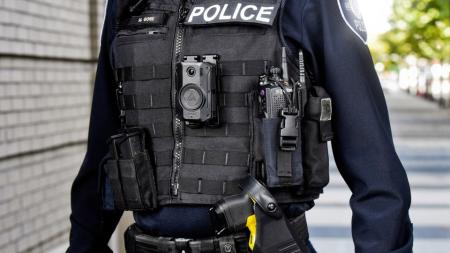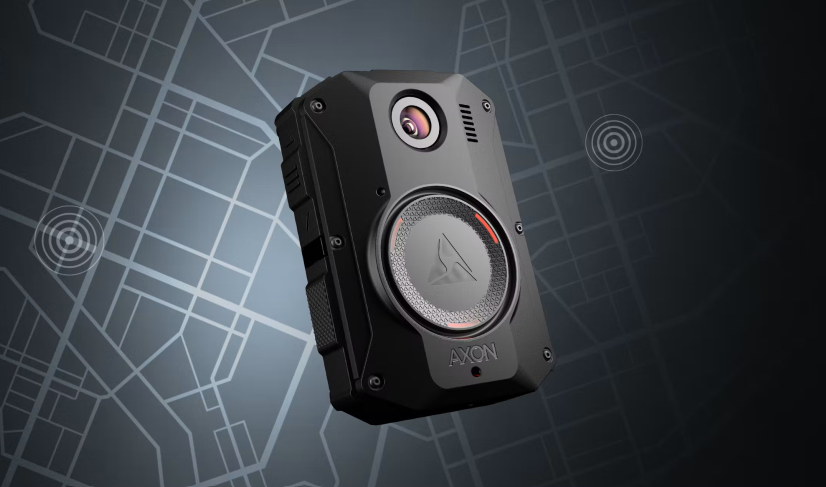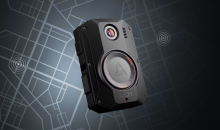Body Worn Cameras
Body Worn Cameras

In April 2023, APD began deployment of Body Worn Cameras (BWC) throughout the Department. This in turn will create greater transparency and accountability in its interactions with the public.
Deployment of the cameras will be on a rolling basis, with a goal of ensuring every sworn personnel is issued a camera as a part of their required gear within a year.
Body Worn Cameras FAQ
The Alexandria Police Department will soon be implementing BWCs as part of their uniform. The

What is a Body Worn Camera?
A BWC is a small device that is attached to an officer’s uniform and records interactions between community members and the police department. The cameras will capture both audio and video through a forward-facing camera. The recordings are then downloaded onto a digital storage platform where the encrypted evidence is managed and stored.
How does an officer's BWC work, and how is a BWC different from a dashboard camera or CCTV system?
The BWCs include a front-facing screen, a one-touch record button, and up to 12 hours of battery life. A dashboard camera is affixed to the vehicle, therefore only capturing images from the front of the vehicle. BWCs allow the footage to capture the officer's movements and what is in front of them. Closed Circuit Television Cameras (CCTVs) are stationary systems that monitor public spaces, without audio, for crimes in progress.
What are some of the primary limitations of a BWC?
- A BWC does not follow an officer's eyes or see as they see.
- Camera speeds differ from real life.
- Cameras may see better than the human eye in low light.
- An officer's body may obstruct the camera’s view.
- The camera only provides one angle of a scene.
- A camera can never replace a thorough investigation.
Why is APD beginning to use BWCs?
The use of BWCs benefits members of the community and APD by improving police services, increasing accountability and transparency for individual interactions, and will help strengthen trust among law enforcement and the community.
Will the public be allowed to view BWC videos?
Yes, the Virginia Freedom of Information Act (FOIA) allows members of the public to request access to Body-Worn Camera (BWC) files. Additionally, if an individual is charged with a crime, they may also be able to obtain access to these files through the legal process of discovery.
What will prompt an officer to activate a BWC?
While there are many situations that require BWC activation, employees must rely on their best judgment to determine when to activate the device in situations not explicitly covered by this policy. Employees shall activate their BWC device before the activity to be recorded or at the earliest safe and practical opportunity.
To ensure complete and accurate records of official law enforcement contacts and activities, employees are required to activate their BWCs in the following circumstances:
- In-person interactions with members of the public, unless such contact is informal, non-investigative, and non-adversarial.
- Application of force, the threat of force, or where force is reasonably anticipated.
- Use of law enforcement weapons, such as firearms, tasers, pepper spray, or impact weapons
- On-scene activities related to an active search, pursuit, or apprehension of a fleeing, concealed, or barricaded individual.
- On-scene activities associated with the care and investigation of an injured or deceased individual.
- On-scene searches of individuals and tangible property, as well as any subsequent seizures of property or evidence, excluding those searches occurring within APD Headquarters.
- Activities within the boundaries of a crime scene.
- Emergency vehicle operations, including vehicle escorts where emergency equipment is continuously or intermittently activated.
- Transporting members of the public, whether in custody or not, except during a department-approved ride-along.
- Immediately following any officer-involved accident, injury, or vehicle crash, unless it is impractical or unsafe to do so.
- Obtaining a breath or blood sample for a DUI arrest, including during the observation period.
- Interactions with a Magistrate, provided the employee is accompanied by an arrestee, suspect, victim, or witness.
- As directed by a supervisor.
- Employees may record incidents that are not explicitly covered by this policy, as long as it serves a law enforcement purpose and is not otherwise restricted by policy.
How long will BWC files/footage be retained?
All BWC files shall be securely stored in accordance with the Virginia Public Records Act and the retention schedules for law enforcement records issued by the Library of Virginia. BWC recordings that have administrative or evidentiary value will be retained in accordance with the General Schedule (GS) 17 Records Retention guidelines for law enforcement records. Employees will log BWC videos into four categories for retention purposes, as follows:
Category 1: Informal Contacts and Accidental/False Activations: This category includes any BWC activation during an informal, non-enforcement contact, resulting in no enforcement action, including accidental and inadvertent signal activations. Records are retained according to appropriate schedules, such as Series 200163, with a minimum retention period of six months.
Category 2: Formal Contacts with No Criminal Activity: This category includes any BWC activation during an official law enforcement contact, such as traffic stops, subject checks, and calls for service, that do not involve an actual or suspected criminal offense. Records are retained according to appropriate schedules, such as Series 200148, with a minimum retention period of five years.
Category 3: Formal Contacts Involving Actual or Suspected Misdemeanor Crimes: This category includes any BWC activation related to an official law enforcement contact involving an actual or potential misdemeanor offense. Records are retained according to appropriate schedules, such as Series 200147, with a minimum retention period of fifty years.
Category 4: Formal Contacts Involving Actual or Suspected Felony Crimes: This category includes any BWC activation during an official law enforcement contact involving an actual or potential felony offense. Records are retained according to appropriate schedules, such as Series 200145, with a minimum retention period of one hundred years.
Who will wear a BWC?
All sworn employees of this department will be assigned a BWC device. Certain employees are exempt from the BWC wear and use requirement, fully or in part, based on the nature of their assignment. These exemptions are as follows:
Undercover Employees: Employees assigned to full-time undercover assignments are not required to wear and use their BWC during investigative or administrative tasks. However, when transitioning to an enforcement role, and if time and circumstances permit, they shall wear and use their BWC in accordance with this policy.
Covert Employees: Employees not permanently assigned to undercover roles but occasionally assume a covert function are exempt from wearing and using their BWC during those specific instances. However, upon completing the covert assignment or when transitioning to an enforcement role, they must wear and use their BWC in accordance with this policy.
Office of Professional Responsibility (OPR): OPR employees may choose not to wear a BWC during administrative or investigative activities related to their job function, if they reasonably can articulate that doing so would adversely impact their investigation. However, in all other situations, OPR employees must adhere to this policy and wear their BWC in accordance with this policy.
Task Force Employees: Employees assigned to a regional, state, or federal task force are required to wear and use their BWC in accordance with this policy, unless prohibited by their respective task force policy. If a prohibition exists, the task force officer shall comply with this restriction to the extent explicitly restricted by the task force policy.
Class-A Uniformed Employees: Employees wearing a Class-A Uniform are not required to wear a BWC as these uniforms are intended for ceremonial activities.
What are some of the privacy and public notice considerations?
Employees are not required to obtain consent or provide notification to members of the public when recording an interaction. However, employees should remain mindful that choosing to provide notification may be beneficial in de-escalating incidents and achieving compliance.
Employees shall answer affirmatively if asked if an interaction is being recorded, unless doing so would adversely impact officer safety or an investigative objective.
Employees are not required to deactivate their BWC at the request or demand from a member of the public. However, employees may choose to honor the request if they believe it will improve the outcome of the interaction. Employees who choose to comply with a request to deactivate their BWC shall comply with all of the following conditions:
- The decision to deactivate the BWC device shall be based on the best judgment of the employees and the desired outcome of the law enforcement interaction.
- The request for deactivation shall be initiated by a member of the public, and employees shall capture the request on their recording and document it in a report.
- The interaction shall be non-confrontational and stable, with no foreseeable need for force or apprehension.
- Employees shall be accompanied by at least one other employee who can serve as a witness. Alexandra Co-Response Program (ACORP) Officers may rely on their partner clinician to satisfy this witness requirement.
Supervisors have the authority to permit employees to deactivate their BWCs in situations that do not meet the above conditions, based on their best judgment and consideration of department and community interests.
